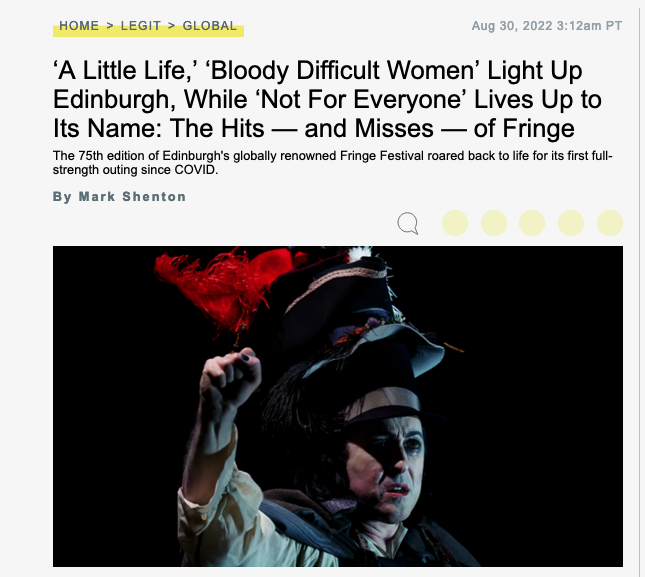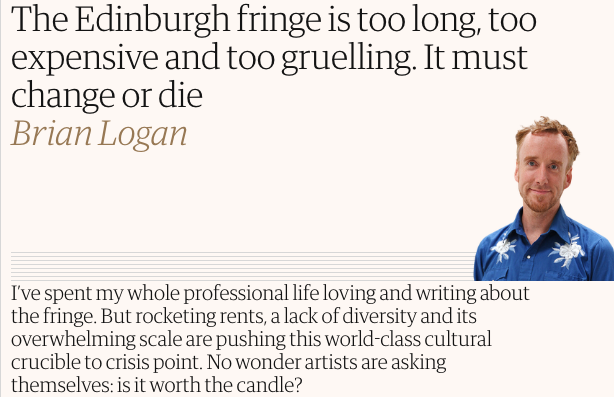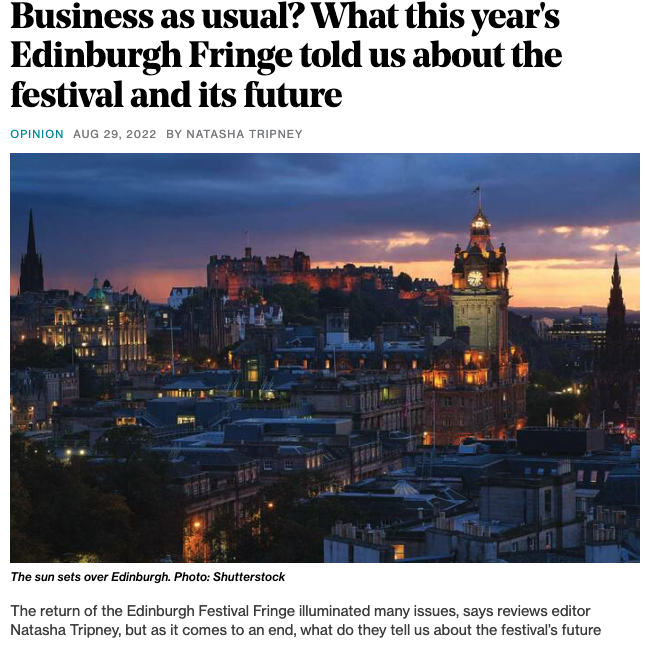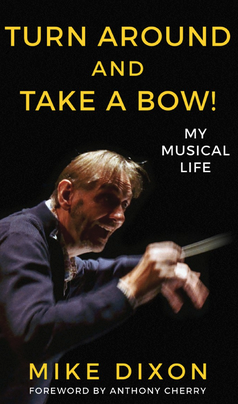Welcome to today’s edition of ShentonSTAGE Daily, on the first day of the (meteorological) autumn — the first day of the astrological autumn doesn’t come till September 23. As we plunge into a season of ever-shortening days, we do at least have quite a bit of new theatre to look forward to; my regularly updated feature of new openings in London, selected regional theatres and on Broadway is here: https://shentonstage.com/theatre-openings-from-w-c-august-29/
I’ve just booked a return trip to New York — my first since we let go of our apartment there in May — to celebrate my next (BIG!) birthday on September 12; I’ll be there from the day after, September 13-19, and the updated list includes a slew of new Broadway openings.
EDINBURGH 2022: POST-MORTEMS
Meanwhile, this year’s Edinburgh Festival and Fringe concluded over the weekend. Various commentators, myself included, have offered our post-mortems. Mine can be found on Variety here.

Meanwhile, in The Guardian, comedy critic Brian Logan offered this verdict:

In The Stage, reviews editor Natasha Tripney wondered aloud:

“Visiting Edinburgh during the fringe requires navigation skills – between the city’s many bridges, hills and stairwells, its Google map-resistant corners, between venues that surreptitiously shift locations, between the queues and the loos. But this year, there was also another level of navigation required. It was necessary to navigate the chasm of the past three years, and all that had happened to the world during that time – the gap between who you were then and who you are now.
Walking around, it was hard not to notice the closed shops on Princes Street and the businesses that hadn’t survived (RIP Spoon on Nicolson Street), all underscored by a nagging awareness that one’s own physical stamina for racing around the place and subsisting on falafel was perhaps not quite what it was.”
And in The Scotsman, political reporter Conor Matchett revealed a chasm between festival organisers (many of them only in the City for the festival itself) and the reality of living there:

ROCKING ON WITH WE WILL ROCK YOU
I often quote the reviews that originally greeted We Will Rock You when I wonder aloud what the point of critics is. When it first opened at the Dominion Theatre back in 2002, we were not exactly welcoming: “Only hard-core Queen fans can save it from an early bath,” wrote my then Daily Express colleague Robert Gore-Langton, and I myself called it a “grim spectacle” and “tacky, trashy tosh” in the Sunday Express.
Those were some of the kinder comments: Michael Coveney, then writing for the Daily Mail, named it a “shallow, stupid and totally vacuous new musical,” the Mail on Sunday’s Georgina Brown agreed that this “dire, dull show” could “easily be summed up in two words: rock bottom”, and the Telegraph’s Charles Spencer opined that far from being guaranteed to blow your mind, it was instead “guaranteed to bore you rigid”, concluding “The show is prole-feed at its worst”.

Of course the show would go on to run for over 12 years in one of London’s largest theatres, and also won a special Audience Award at the Laurence Olivier Awards in a public vote for people’s favourite show, and is even now back on the touring road (playing Sheffield this week and Manchesfter next)

Reading original musical director (and the show’s long-term musical supervisor) Mike Dixon describing how the company received those reviews, in his new and fascinating autobiography TURN AROUND AND TAKE A BOW! — MY MUSICAL LIFE (published by Troubadour) is chastening. Previews and the first night had gone so well that “the overall feeling was so good and positive that when the reviews hit the following morning the sense of incredulity was heightened to the extreme. Were those critics watching the same show.? With two exceptions they completely vilified it. Ben [Elton]’s script was particularly savaged but actually the notices pretty much rubbished everything and everyone. The only two critics who seemed to ‘get it’ were the Financial Times and The Sun. Two rather interesting extremes.”
But two events turned around the show’s commercial fortunes, despite the initial bashing. One was an appearance on BBC1’s Parkinson show; the other was a live showing on the Queen’s Golden Jubilee concert, live from Buckingham Palace.
The box office immediately registered a huge uptick, and Dixon writes, “Even though we had been panned by those critics we became a huge hit with Dame Audience. Apparently it is a knack perfected by Queen. After all, when Bohemian Rhapsody was released it was also mauled by the music press and then went on to become one of the biggest songs on the planet, perhaps even THE biggest.”
Were we critics wrong about WE WILL ROCK YOU, then? Not necessarily. But we underestimated the public appetite for a show full of spectacular rock anthems that are much beloved, presented in a production that was full of its own spectacle. I revisited it long after it opened, and could see the audience having a genuinely good time. It’s a show that connected to its audience, but not to most of us critics.
THE NARCISSIST (Chichester Festival Theatre’s Minerva)
It was at the Royal Court that American playwright Christopher Shinn received many of his premieres, including Pulitzer Prize finalist Dying City: it was a theatre keeping faith with one of its great discoveries. No writer of comparable stature has been nurtured there in the years since, where a regime change has long seen the theatre dwindle in stature to the point that it is no longer an essential destination for theatregoers interested in new writing.

You can’t, of course, keep a good writer down — he’s gone on to have plays produced at the Donmar, Soho and Almeida — and is now back with THE NARCISSIST, his best play since those that introduced him to us at the Court, but at Chichester. Daniel Evans, its artistic director, starred in the Royal Court premiere of Shinn’s 2002 play Where Do We Live, and it’s fantastic to see him 20 years later using his own power to now programme him: this is the sort of play that once would have galvanised the Court, and is now electrifying Chichester instead (Interesting sidebar: the casting director is Amy Ball, head of casting at the Court where she casts all productions for both the main house and Theatre Upstairs, so this show could easily belong there).
Even more generously, Evans hasn’t elected to direct it himself, but entrusted it to a rising younger gay Cambridge-educated director Josh Seymour. A personal sidebar: I’ve known Seymour since before he even went to University, when as a North London schoolboy he wrote to me about my work as a critic, and I ended up taking him to see the West End transfer of THE HISTORY BOYS at Wyndham’s in 2007 as my guest (he’d confessed a particular passion for its star Steven Webb, who was playing Posner).
He also lured me to Cambridge to see one of his student directorial efforts at the Corpus Playroom — a venue that I’d produced several shows at during my own time in Cambridge. Since graduating, he’s worked through the usual route of the fringe and assistant directing, including resident assistant director at the Donmar — and he became associate director to Dominic Cooke’s 2017 National Theatre revival of FOLLIES and more recently Cooke’s revival of THE NORMAL HEART.
So I love how the theatrical torch is being passed on from generation to generation, and the small part I’ve played in that. And watching his supremely confident handling of Shinn’s complex, layered and fast-paced political drama made me feel very proud of how far he has come.
The play is about an idealistic but burnt out Democratic Party adviser, played out against the backdrop of the last six years of toxic upheaval in the US political landscape, that is full of ideas and tension. Trump is never mentioned by name but hovers over the action, like a dire warning.

As played by the magnificent Harry Lloyd (pictured above), he is a compellingly troubled but tenderly revealed character of conviction but also contradiction: I truly believed in him and his prevarications and uncertainties (including over his own sexuality, and the claims of his family including an opioid addicted brother).
In Seymour’s terrific, dynamic production — fluidly and effortlessly marshalling the action between different locations and time-frames — Lloyd is well supported by a cast that also includes the wonderful Claire Skinner as the Senator he is advising.
SEE YOU ON MONDAY
I’ll be back here on Monday. If you can’t wait that long, I may also be found on Twitter here: https://twitter.com/ShentonStage/ (though not as regularly on weekends)

